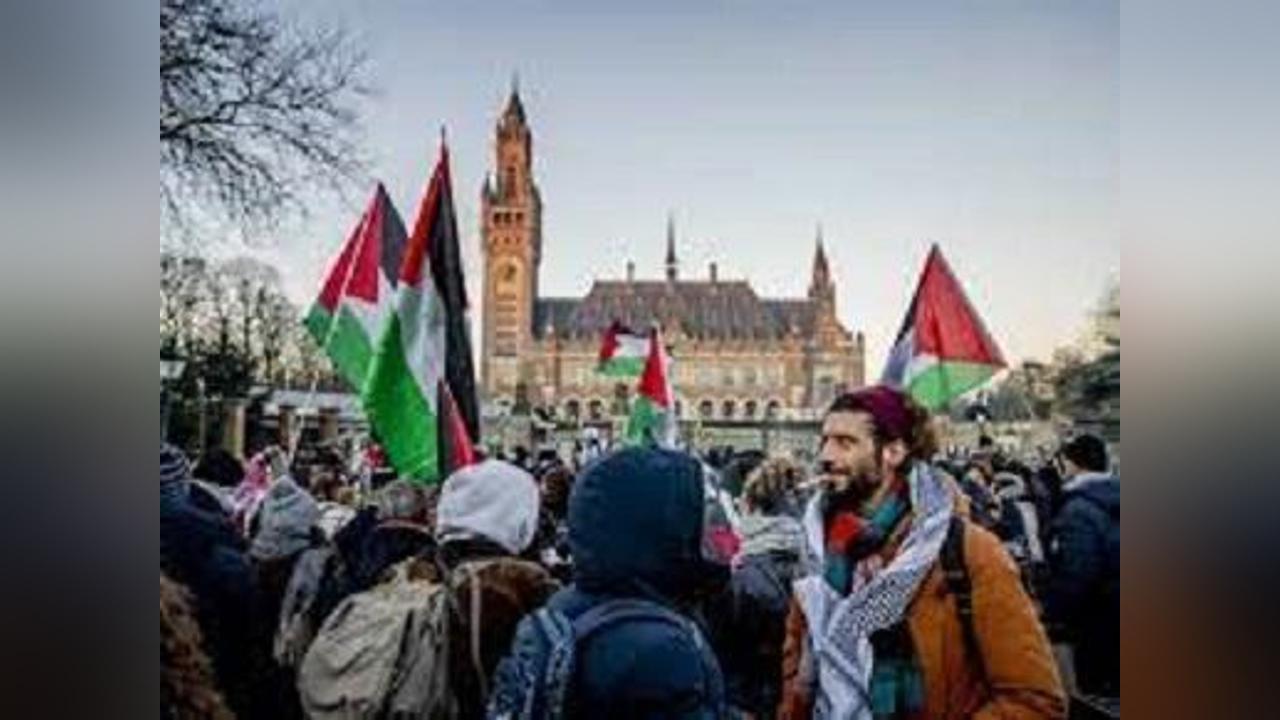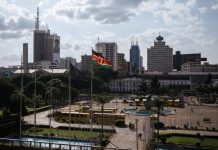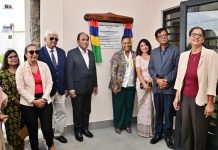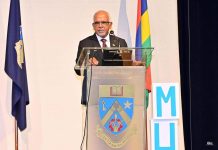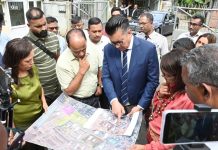Africa-Press – Mauritius. Two U. S. lawmakers recently introduced a bill in Congress that would require “a full review of the bilateral relationship between the United States and South Africa,” after South Africa brought its case to the International Court of Justice last month accusing Israel of violating the Genocide Convention in Gaza.
Or, as Representatives John James and Jared Moskowitz, a Republican and Democrat respectively, put it: “given South Africa’s recent positioning and coordination with America’s adversaries,” including what they call “anti-Semitic and anti-Israel-related statements and actions.
” The proposed U. S.
-South Africa Bilateral Relations Review Act is another textbook example of the bipartisan commitment in Washington to shielding Israel from any accountability for its human rights abuses.
In late January, days before the ICJ released its initial order in the genocide case against Israel, 210 members of Congress signed a letter to Secretary of State Antony Blinken—drafted by both Democrats and Republicans—denouncing the proceedings in The Hague and South Africa specifically for making “grossly unfounded and defamatory charges against Israel.
” Days later, in its ruling, the ICJ found it “plausible” that Israel’s actions in Gaza could amount to genocide and ordered Israel to abide by provisional measures to protect Palestinians in Gaza from what the court called a “real and imminent risk” of violations to their rights under the Genocide Convention.
The bill in Congress comes at a time when South Africa’s foreign policy has finally started moving in a more human-rights-friendly direction. In the nearly 30 years since South Africa became a democracy following the end of apartheid, the country’s foreign policy has rarely aligned with the values of its constitution.
Its application to the ICJ represents a shift, moving South African foreign policy closer to its constitutional ideals, as it tries to restore the reputation it gained after the fall of apartheid as a moral authority around the world.
Consider President Cyril Ramaphosa’s televised address to South Africans after the ICJ’s ruling. “Some have told us to mind our own business. Others have said it was not our place.
And yet it is very much our place, as people who know too well the pain of dispossession, discrimination, state-sponsored violence,” he declared. “We are also a people who were the victims of the crime of apartheid.
We know what apartheid looks like. . . We, as South Africans, will not be passive bystanders and watch the crimes that were visited upon us being perpetrated elsewhere.
” Yet this kind of language has been missing in South African foreign policy in other areas.
Since the end of apartheid, governments in Pretoria have hardly upheld the constitution’s commitment to “the democratic values of human dignity, equality and freedom” in their dealings with other countries.
Most recently and glaringly, by maintaining close ties with Russia after its invasion of Ukraine two years ago. South Africa has abstained from a number of United Nations General Assembly resolutions condemning Russian aggression in Ukraine.
Last August, South Africa hosted the BRICS summit during which Russian President Vladimir Putin was given a friendly platform to speak. South African leaders, like Ramaphosa, have conveniently overlooked the fact that most of the BRICS countries have questionable human rights records.
Instead, Ramaphosa’s government embraced the idea of a multipolar world and voted to extend BRICS membership to six other countries from the Global South.
According to Adam Habib, a South African scholar of international relations, such moves appear to many critics as a betrayal of South Africa’s democratic transition—and there are many more examples beyond Russia and the BRICS.
“Human rights activists had become demoralized by South Africa’s defense of ‘rogue powers’ and its refusal to support resolutions in the Security Council condemning and imposing sanctions on states such as Iran, Myanmar, Sudan and Zimbabwe,” Habib wrote in 2009.
South Africa’s support for Palestinians is not only motivated by human rights and humanitarian concerns, but also by an ambitions foreign policy agenda.
Its aim goes beyond just rebuilding South Africa’s global image as a moral beacon, shaped by its struggle against apartheid. It also aims to subvert Western hegemony and assert South Africa’s place in a rising Global South. The ICJ’s initial ruling against Israel was significant for many reasons.
But for South Africa, it was arguably most important as an assertion of its position within the Global South and of the message of universality—that everyone around the world, without exception, has equal human rights—inherent in its application to the ICJ.
The fact that South Africa’s case was supported by more than a dozen other countries in the Global South indicates solidarity not only with Palestinians in Gaza but also with the idea that the plight of the Palestinians is universal.
This message of solidarity has also been expressed in the massive pro-Palestinian protests worldwide since October calling for a cease-fire. It is no coincidence that the near-unanimous decision in The Hague emanated from an international court that is heavily represented by judges from the Global South.
Some commentators have argued that by supposedly “choosing sides,” South Africa has reduced its ability to be an independent mediator in the Israel-Palestine conflict.
But South Africa has been vocal in its support for mediation efforts that could bring about a cease-fire. In November, for example, Ramaphosa praised Qatar for its leading position in negotiating for the release of hostages held by Hamas.
South Africa’s support for Palestine has deep roots. Nelson Mandela was a close friend of Yasser Arafat. On one of his first foreign visits, just 16 days after he was released from prison on Robben Island in 1990, Mandela was embraced by Arafat in Lusaka, Zambia.
Three months later, Mandela attended a summit in Algiers wearing the Palestinian keffiyeh. And in 1997, during his presidency, Mandela famously said, “Our freedom is incomplete without the freedom of the Palestinians.
” To pay tribute to Mandela, a giant statue was unveiled in Ramallah in 2016. Ramallah’s then-mayor, Mussa Hadid, said the statue “symbolizes the shared suffering” of the South African and Palestinian peoples.
The site of the statue was also the site of celebrations the night before the ICJ hearings started in The Hague in January, when Palestinians gathered to publicly thank South Africa for litigating on its behalf.
By going to the ICJ on Palestinians’ behalf, South Africa has put Arab governments to shame, as they speak about solidarity but do little to actually defend Palestinian rights.
With elections looming in South Africa later this year, the ANC is at risk of losing its majority in parliament for the first time since the end of apartheid.
Many South Africans are worrying more about longstanding domestic problems of corruption, service delivery and sky-high youth unemployment than any foreign policy issue, including Palestine.
Although tens of thousands of South Africans have taken to the streets to protest Israel’s war in Gaza, South African society is still sharply polarized, with a significant proportion of the population that supports Israel and sharply opposes the government’s stance.
During a visit to the West Bank and Gaza in the aftermath of Israel’s 2014 war in Gaza, Operation Protective Edge, many politicians and policymakers I spoke to, Palestinian and Israeli, lamented the absence of visionary leadership among both Palestinians and Israelis, a Mandela-like figure who could bring them closer together.
But it is helpful to remember South Africa. “I used to be terribly pessimistic about the situation in South Africa,” John Dugard, the South African former U.
N. special rapporteur for human rights in the Palestinian territory, who now leads the legal team for South Africa in the ICJ case, said in a speech in 2021.
“I always believed that civil war was inevitable. But then, sanity prevailed, wise men came to their senses, and a miracle occurred.
In South Africa, apartheid was abandoned and we brought a constitutional democracy instead. ” “Palestine is the land of miracles,” he added, “and one hopes that a similar miracle will occur.”
For More News And Analysis About Mauritius Follow Africa-Press


